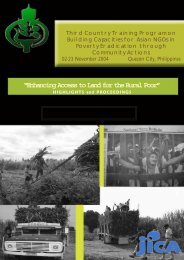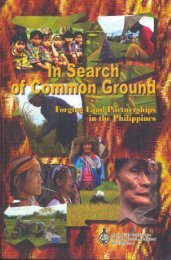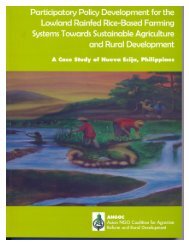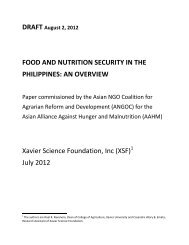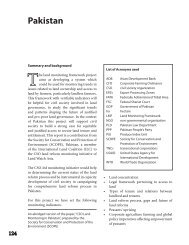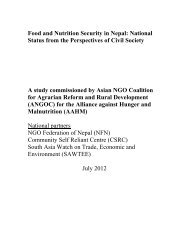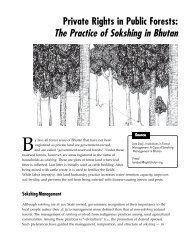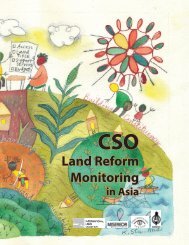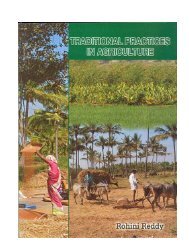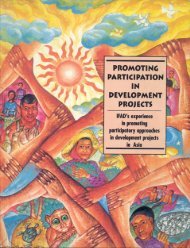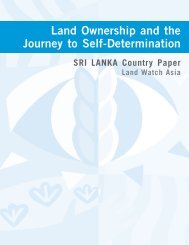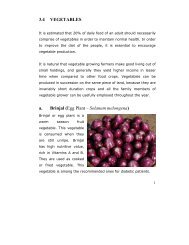Securing the Right to Land FULL - ANGOC
Securing the Right to Land FULL - ANGOC
Securing the Right to Land FULL - ANGOC
You also want an ePaper? Increase the reach of your titles
YUMPU automatically turns print PDFs into web optimized ePapers that Google loves.
Provides for a land distribution policy <strong>to</strong> benefit <strong>the</strong> rural<br />
poor, specifically through <strong>the</strong> grant of Social <strong>Land</strong> Concessions<br />
(SLCs) (Article 17).<br />
Forest Law of 2002<br />
Provides <strong>the</strong> framework for forest classification;<br />
Provides for <strong>the</strong> creation and management of community<br />
forests, such that communities are granted an area within<br />
<strong>the</strong> Permanent Forest Reserve <strong>to</strong> manage and derive benefit<br />
from;<br />
Guarantees <strong>the</strong> entry rights of local communities in<strong>to</strong> forest<br />
concessions (Article 15,40);<br />
Prohibits <strong>the</strong> logging of certain trees valuable <strong>to</strong> local communities,<br />
such as resin producing trees, or trees likely <strong>to</strong><br />
produce resin; as well as trees and areas of cultural or religious<br />
significance, such as spirit forests (Article 45); and<br />
Mandates <strong>the</strong> sustainable logging of natural and plantation<br />
forests (Article 10).<br />
Sub-Decrees of <strong>the</strong> <strong>Land</strong> and Forestry Laws<br />
Sub-Decree on Social <strong>Land</strong> Concessions of 2003<br />
Puts large tracts of wasteland <strong>to</strong> productive use for <strong>the</strong> benefit<br />
of <strong>the</strong> poor through <strong>the</strong> award of Social <strong>Land</strong> Concessions<br />
(SLCs). SLCs could serve as a <strong>to</strong>ol <strong>to</strong> develop remote<br />
areas, provide homes for <strong>the</strong> urban and rural poor, encourage<br />
<strong>the</strong> relocation of workforces on ELCs; and provide land for<br />
displaced people or families of war veterans and casualties.<br />
Problems in implementation:<br />
> The Commune Councils (CCs) are responsible for submitting<br />
<strong>the</strong> local SLC plan. In <strong>the</strong> absence of mechanisms<br />
for independent moni<strong>to</strong>ring of this CC task, <strong>the</strong><br />
system has been marred by corruption and nepotism;<br />
> The process of allocating land for SLCs has been <strong>to</strong>o<br />
slow. Donors have attempted <strong>to</strong> put pressure on <strong>the</strong> government<br />
<strong>to</strong> hasten <strong>the</strong> process by making <strong>the</strong> release of<br />
funds contingent on <strong>the</strong> issuance of a target number of<br />
SLCs, but donors have relented anyway despite <strong>the</strong> lack<br />
of progress in this regard.<br />
Sub-Decree on State <strong>Land</strong> Management of 2005<br />
Describes <strong>the</strong> principles and mechanisms for <strong>the</strong> identification<br />
of, registration, and classification of state land, including<br />
regulations on its allocation, management and<br />
re-classification. The determination of which are state public<br />
lands and which are not is necessary for <strong>the</strong> allocation of<br />
SLCs and ELCs.<br />
OVERCOMING A FAILURE OF LAW AND POLITICAL WILL<br />
67<br />
Problems in implementation:<br />
> There are many government agencies involved in <strong>the</strong><br />
various steps for identifying, mapping, and demarcating<br />
land. Hence, progress, especially in demarcating<br />
land, has been slow. Unless lands are properly demarcated,<br />
<strong>the</strong> process of determining which lands could be<br />
awarded as concessions will take longer. Civil society<br />
groups believe that once land has been completely demarcated,<br />
disputes concerning concessions will be significantly<br />
reduced.<br />
Sub-Decree on Economic <strong>Land</strong> Concessions of 2005<br />
Provides <strong>the</strong> criteria for awards of ELCs, and sets a ceiling of<br />
10,000 hectares on ELCs;<br />
Defines what purposes ELCs could serve, for example:<br />
> Intensive agro-industrial production;<br />
> Job creation;<br />
> A magnet for foreign direct investment (FDI);<br />
> O<strong>the</strong>r revenue generating activities for <strong>the</strong> State.<br />
Requires public consultation with <strong>the</strong> local community prior<br />
<strong>to</strong> <strong>the</strong> grant of ELCs (Article 35);<br />
Requires <strong>the</strong> concessionaire <strong>to</strong> comply with safety measures,<br />
such as environmental impact assessments, etc. (Article 4);<br />
Problems in implementation:<br />
> Despite <strong>the</strong> legally mandated ceiling on <strong>the</strong> size of ELCs,<br />
<strong>the</strong> government continues <strong>to</strong> grant ELCs beyond <strong>the</strong><br />
maximum allowable size, and inside protected areas,<br />
without consideration of <strong>the</strong> social and environmental<br />
impact. Because any activity could be portrayed as having<br />
<strong>the</strong> potential <strong>to</strong> earn revenue for <strong>the</strong> State, <strong>the</strong> grant<br />
of an ELC is like giving <strong>the</strong> concessionaire a blank check<br />
<strong>to</strong> do with <strong>the</strong> land as he wills.<br />
> While <strong>the</strong> sub-decree requires public consultation prior<br />
<strong>to</strong> <strong>the</strong> award of concessions, <strong>the</strong> community is invariably<br />
represented at such consultations by <strong>the</strong> CC members,<br />
who are frequently corrupt. In any case, <strong>the</strong> high<br />
literacy requirements for candidates <strong>to</strong> <strong>the</strong> CC effectively<br />
exclude certain groups, such as indigenous groups<br />
and <strong>the</strong> poor, who are often short of education.<br />
> Provisions for compliance with safety measures in <strong>the</strong><br />
ELCs are routinely ignored with impunity.<br />
Sub-Decree on Community Forestry of 2003<br />
Establishes <strong>the</strong> procedures through which local communities<br />
could be granted temporary control of forest resources<br />
on which <strong>the</strong>ir livelihood depends.<br />
ASIAN NGO COALITION FOR AGRARIAN REFORM AND RURAL DEVELOPMENT



